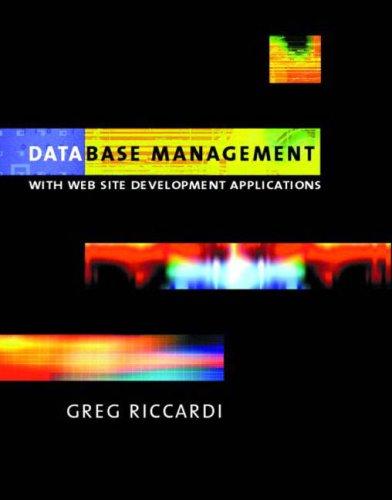Question
This is rust language. Here is my code. use std::env; // Included to access cmd line arguments within the program. use std::fs::File; // Gives access
This is rust language.
Here is my code.
use std::env; // Included to access cmd line arguments within the program.
use std::fs::File; // Gives access to files. Open/Read/Write.
use std::io::prelude::*;// For common I/O tasks.
#[derive(Debug)]
enum Token {
Plus,
Minus,
Star,
Slash,
Equal,
LeftParen,
RightParen,
SemiColon,
Comma
}
// Add two fields to the following struct. One for holding
// a vector of characters, and another that is an index (usize)// into the vector.
#[derive(Debug)]
struct Scanner{
char_vec: Vec
index: usize,
}
// Implement the following methods for the Scanner struct:
// (1) A "new" method that creates a scanner from a String
// (2) A "get_next_token" method that returns an Option
// representing the next symbol in the vector (or None
// when appropriate).
impl Scanner{
pub fn new (input: &Vec
Scanner{
char_vec: input.clone(),
index: 0,
}
}
pub fn get_next_token(&mut self) -> Option
if self.index >= self.char_vec.len() {
return None;
}
while self.index < self.char_vec.len() {
let c = self.char_vec[self.index];
self.index += 1;
let v = match c {
'+' => Some(Token::Plus),
'-' => Some(Token::Minus),
'*' => Some(Token::Star),
'/' => Some(Token::Slash),
'=' => Some(Token::Equal),
'(' => Some(Token::LeftParen),
')' => Some(Token::RightParen),
';' => Some(Token::SemiColon),
',' => Some(Token::Comma),
chr => {
if chr.is_whitespace() {
continue
}
else {
return None
}
}
};
return v
}
return None
}
}
// The main function should do the following:
// (1) Read the contents of a file into a String. The name of
// the file is given as a program argument.
// (2) Create a scanner object with the String.
// (3) Use a "while let" loop to print all Tokens found in the
// String.
fn main() {
let args: Vec
let file_name = arg_parse(&args); // Receives values from fn arg_parse().
// Opens file whose name is passed via cmd line.
let mut inputfile = File::open(file_name).expect("File Not Found.");
// Creates a new mutable string variable to hold the contents of file.
let mut contents = String::new();
// Passes reference to contents, file is read.
inputfile.read_to_string(&mut contents).expect("Something went wrong reading the file.");
// Creates a char Vector to hold the contents.
let char_vec: Vec
let mut scanner = Scanner::new(&char_vec);
// Loop to print out all the tokens
while let Some(value) = scanner.get_next_token() {
println!("{:?}", value);
}
}
// Function for parsing cmd line arguments.
fn arg_parse(args: &[String]) -> (&str) {
let file_name = &args[1]; // Assigns the first cmd argument to a variable.
(file_name) // Variables passed back to Main().
}
The goal of my program is again to print out all of the tokens in a given file. My program will take one command line argument, and can be compiled and run with the command.
My program need to read the file and print all of the tokens that it finds. Specifically, my program should be able to detect the following tokens:
-------------------------------- Punctuators -------------------------------- + -> Plus - -> Minus * -> Star / -> Slash = -> Equal ( -> LeftParen ) -> RightParen ; -> SemiColon , -> Comma { -> LeftBrace } -> RightBrace < -> Less ! -> Bang == -> EqualEqual -------------------------------- Tokens that store values -------------------------------- "abc" -> StringLiteral("abc") 123.4 -> NumberLiteral(123.4) some_var -> Identifier("some_var") -------------------------------- Reserved keywords -------------------------------- print -> Print var -> Var con -> Con if -> If else -> Else while -> While and -> And or -> Or Input_file1:
hello+there-how*are/you
Output for the Input_file1:
Identifier("hello") Plus Identifier("there") Minus Identifier("how") Star Identifier("are") Slash Identifier("you") Input_file2:
print "Hello, world!"; var a = 123; con b = "onetwothree"; var c = 234; var d_123 = "d_123"; if a < c { print "OK"; } else { print "Not OK"; } while a < c { print "Still OK"; a = a + 1; } "@ny ch@racter$ @re g@me in a string !@#$%^&*()-" Output for the input_file2:
Print StringLiteral("Hello, world!") SemiColon Var Identifier("a") Equal NumberLiteral(123) SemiColon Con Identifier("b") Equal StringLiteral("onetwothree") SemiColon Var Identifier("c") Equal NumberLiteral(234) SemiColon Var Identifier("d_123") Equal StringLiteral("d_123") SemiColon If Identifier("a") Less Identifier("c") LeftBrace Print StringLiteral("OK") SemiColon RightBrace Else LeftBrace Print StringLiteral("Not OK") SemiColon RightBrace While Identifier("a") Less Identifier("c") LeftBrace Print StringLiteral("Still OK") SemiColon Identifier("a") Equal Identifier("a") Plus NumberLiteral(1) SemiColon RightBrace StringLiteral("@ny ch@racter$ @re g@me in a string !@#$%^&*()-") Step by Step Solution
There are 3 Steps involved in it
Step: 1

Get Instant Access to Expert-Tailored Solutions
See step-by-step solutions with expert insights and AI powered tools for academic success
Step: 2

Step: 3

Ace Your Homework with AI
Get the answers you need in no time with our AI-driven, step-by-step assistance
Get Started


